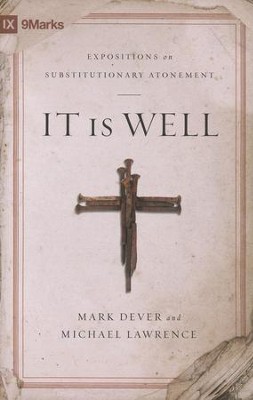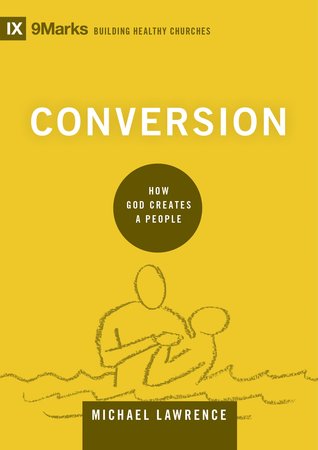
Quotes by Michael Lawrence
Like Adam and Eve, most of the time the real object of our worship isn’t some creature out there, it’s this creature right here. In the end, my idolatry centers on me. What’s more, if I can persuade you or bully you or manipulate you, my idolatry will include you worshiping me as well.
The Story of the Fall by Michael Lawrence taken from Biblical Theology by Michael Lawrence, copyright 2010, Crossway Books, a division of Good News Publishers, Wheaton Illinois 60187, www.crosswaybooks.org. Page 135.
The fall is progressive, not static. Things don’t just go from good to bad. Rather, things continue to get worse. They don’t stay the same, and they don’t get better. It’s like a fatal disease that begins at a point in time, but then progresses and runs its ever increasingly destructive course.
The Story of the Fall by Michael Lawrence taken from Biblical Theology by Michael Lawrence, copyright 2010, Crossway Books, a division of Good News Publishers, Wheaton Illinois 60187, www.crosswaybooks.org. Page 133-134.
[Do we] want a ministry designed to amuse the dying or a ministry aimed at raising the dead?
The Story of Creation by Michael Lawrence taken from Biblical Theology by Michael Lawrence, copyright 2010, Crossway Books, a division of Good News Publishers, Wheaton Illinois 60187, www.crosswaybooks.org. Page 124
Whenever and whatever God creates, it’s an act of powerful, irresistible grace. Nothing forces God to speak. He only speaks when He wants to. But when He does speak, things happen… God speaking is God acting… When the voice of God rings out in gracious, creative power, not even death or unbelief can resist Him.
The Story of Creation by Michael Lawrence taken from Biblical Theology by Michael Lawrence, copyright 2010, Crossway Books, a division of Good News Publishers, Wheaton Illinois 60187, www.crosswaybooks.org. Page 123
Fundamentally, sin is a matter of our hearts, for as fallen creatures our ruling desire is to remove God from His throne and to sit there instead.
The Story of the Fall by Michael Lawrence taken from Biblical Theology by Michael Lawrence, copyright 2010, Crossway Books, a division of Good News Publishers, Wheaton Illinois 60187, www.crosswaybooks.org. Page 135.
Some people are fond of debating whether or not we have free will. The Bible’s answer is that it depends on what you mean by “free.” If by “free” you mean that we do what we want to do, that nothing forces us to believe or to act against our will, then the Bible’s answer is “yes.” Our will is always free to act in accord with its nature. But if by “free” you mean that somehow our will is morally neutral and above the fray, able to choose between good and evil on its own merits, independent of predisposition or motive, then the answer is a clear and unequivocal “no.” Our nature is corrupted and, as Paul says, we are sold as slaves to sin. We can no more choose not to be sinners than a fish can choose not to be a swimmer. It’s our nature.
The Story of the Fall by Michael Lawrence taken from Biblical Theology by Michael Lawrence, copyright 2010, Crossway Books, a division of Good News Publishers, Wheaton Illinois 60187, www.crosswaybooks.org. Page 136.
Understanding our inability to choose God unless God first chooses us actually frees the evangelist to evangelize, and leaves the converting to God!
The Story of the Fall by Michael Lawrence taken from Biblical Theology by Michael Lawrence, copyright 2010, Crossway Books, a division of Good News Publishers, Wheaton Illinois 60187, www.crosswaybooks.org. Page 136.
Without theological vision, a vision that wrestles with what it means to be God’s people, in God’s world, under God’s rule, the church inevitably loses both its identity as God’s possession and its purpose as the people and place where God’s glory is displayed in the gospel and God’s praise is declared.
Systematic Theology Tools by Michael Lawrence taken from Biblical Theology by Michael Lawrence, copyright 2010, Crossway Books, a division of Good News Publishers, Wheaton Illinois 60187, www.crosswaybooks.org. Page 110.
Many of us, I think, fear that doctrine will simply become the dead wood of orthodoxy in our church, and so we cut it out whenever we can. In fact, doctrine is the fuel God has given us that, when lit by the fires of grace, burns in a white-hot devotion of Christian worship and discipleship.
Systematic Theology Tools by Michael Lawrence taken from Biblical Theology by Michael Lawrence, copyright 2010, Crossway Books, a division of Good News Publishers, Wheaton Illinois 60187, www.crosswaybooks.org. Page 108.
The fall marks one of the most significant divisions in history, and all of us stand on the wrong side of that division. Many things happen in the Bible that don’t have a universal effect. The fall is not one of them.
The Story of the Fall by Michael Lawrence taken from Biblical Theology by Michael Lawrence, copyright 2010, Crossway Books, a division of Good News Publishers, Wheaton Illinois 60187, www.crosswaybooks.org. Page 132-133.
In the Old Testament we have the gospel promised, the gospel foretold, the gospel in seed form. In the New Testament that seed comes into full flower, as the promises are kept and the prophecies are fulfilled.
Biblical Theology Tools 2 by Michael Lawrence taken from Biblical Theology by Michael Lawrence, copyright 2010, Crossway Books, a division of Good News Publishers, Wheaton Illinois 60187, www.crosswaybooks.org. Page 70.
In Jeremiah’s prophecy of the new covenant, Jeremiah explicitly says, “It will not be like the covenant I made with their forefathers, when I led them by the hand out of Egypt” (Jer. 31:32). How will it be different? For one thing, it will be unbreakable (v. 32). For another, all the members of that covenant will be regenerate, the law written on their hearts (v. 33). Yet another difference will be that the covenant will not operate according to natural lines of birth and descent, but through spiritual birth (vv. 29-30). Here the discontinuity between the new covenant and the Mosaic covenant is enormous: a covenant of grace, not works; a covenant that regenerates rather than kills; a covenant entered into through spiritual rather than natural birth. And yet for all this discontinuity, Jeremiah is clear that this new covenant is the ultimate fulfillment of God’s promises to Israel, made to their forefather Abraham.
Biblical Theology Tools 2 by Michael Lawrence taken from Biblical Theology by Michael Lawrence, copyright 2010, Crossway Books, a division of Good News Publishers, Wheaton Illinois 60187, www.crosswaybooks.org. Page 81.
The kingdom was lost to us at the fall and pictured for us as a shadow in the history of Israel. But now, through the life, death, and resurrection of Jesus, the kingdom of God has been inaugurated anew. Sin has been defeated. The church lives out the life of the kingdom by the power of the Spirit. And we look forward to the day when the king returns and consummates His reign, a reign that will have no end.
Biblical and Systematic Theology by Michael Lawrence taken from Biblical Theology by Michael Lawrence, copyright 2010, Crossway Books, a division of Good News Publishers, Wheaton Illinois 60187, www.crosswaybooks.org. Page 94.
Practical problems have theological answers. So the question is not whether or not you’re going to be a theologian, but what kind of theologian you’re going to be.
Systematic Theology Tools by Michael Lawrence taken from Biblical Theology by Michael Lawrence, copyright 2010, Crossway Books, a division of Good News Publishers, Wheaton Illinois 60187, www.crosswaybooks.org. Page 101.
We can’t deduct who God is from what we’re like. God is spirit and God is holy. He is our Creator and our Lord. That means that knowledge of God will demand of us reverence, obedience, and worship. It also means that such knowledge will have to be given to us. We won’t be able to discover it on our own. If we are to know God, God must reveal Himself. And the place He has revealed Himself is through the inspired revelation of Scripture.
Systematic Theology Tools by Michael Lawrence taken from Biblical Theology by Michael Lawrence, copyright 2010, Crossway Books, a division of Good News Publishers, Wheaton Illinois 60187, www.crosswaybooks.org. Page 101.
Conversion is a work of the Holy Spirit changing our nature, not the result of a seeker making a decision.
The Story of the Fall by Michael Lawrence taken from Biblical Theology by Michael Lawrence, copyright 2010, Crossway Books, a division of Good News Publishers, Wheaton Illinois 60187, www.crosswaybooks.org. Page 137.
Conflict with sin is one of the best evidences that someone has been given spiritual life.
The Story of the Fall by Michael Lawrence taken from Biblical Theology by Michael Lawrence, copyright 2010, Crossway Books, a division of Good News Publishers, Wheaton Illinois 60187, www.crosswaybooks.org. Page 137.
If the story of the fall reveals our own sin and guilt, it surely also reveals the amazing depths of God’s love and mercy. It was the Son of God who placed a sword at the entrance to the Garden of Eden. He did it not just to keep Adam out. He did it so that, at just the right time, he could walk through in our place, to satisfy God’s just wrath and make a way for us to enter back in, through the gate, to eat from the Tree of Life and live forever in the glorious presence of God.
The Story of the Fall by Michael Lawrence taken from Biblical Theology by Michael Lawrence, copyright 2010, Crossway Books, a division of Good News Publishers, Wheaton Illinois 60187, www.crosswaybooks.org. Page 140.
It’s not that faith itself is saving. It’s that faith is the way you acknowledge Christ as your substitute… Faith leans on Christ and trusts that when Christ died on the cross, He was dying in your place, for you.
The Story of Sacrifice by Michael Lawrence taken from Biblical Theology by Michael Lawrence, copyright 2010, Crossway Books, a division of Good News Publishers, Wheaton Illinois 60187, www.crosswaybooks.org. Page 163.
On that cross, Christ endured the holocaust of God’s wrath against our sin and exhausted it.
The Story of Sacrifice by Michael Lawrence taken from Biblical Theology by Michael Lawrence, copyright 2010, Crossway Books, a division of Good News Publishers, Wheaton Illinois 60187, www.crosswaybooks.org. Page 163.
From the opening pages of Scripture to their close, the story of God’s redemptive activity is structured by promises made and promises kept.
The Story of Promise by Michael Lawrence taken from Biblical Theology by Michael Lawrence, copyright 2010, Crossway Books, a division of Good News Publishers, Wheaton Illinois 60187, www.crosswaybooks.org. Page 169.
What’s striking when you consider that God is a God of promise is that it means that our lives are, by design, lives of waiting.
The Story of Promise by Michael Lawrence taken from Biblical Theology by Michael Lawrence, copyright 2010, Crossway Books, a division of Good News Publishers, Wheaton Illinois 60187, www.crosswaybooks.org. Page 169.
The story of God’s actions in history is not simply a story of God carrying out His agenda. It’s a story of mercy and love, as He creates and redeems a people for Himself.
The Story of Promise by Michael Lawrence taken from Biblical Theology by Michael Lawrence, copyright 2010, Crossway Books, a division of Good News Publishers, Wheaton Illinois 60187, www.crosswaybooks.org. Page 169.
What is holiness? It’s not simply being set apart from sin. It’s being set apart to the glory and love and work of God.
The Story of Promise by Michael Lawrence taken from Biblical Theology by Michael Lawrence, copyright 2010, Crossway Books, a division of Good News Publishers, Wheaton Illinois 60187, www.crosswaybooks.org. Page 175.
When God makes a promise, you can take it to the bank. God cannot lie, so His promises never deceive. God is all-powerful, so His promises never fail.
The Story of Promise by Michael Lawrence taken from Biblical Theology by Michael Lawrence, copyright 2010, Crossway Books, a division of Good News Publishers, Wheaton Illinois 60187, www.crosswaybooks.org. Page 173.
The Bible is not just a collection of inspired books written by various prophets and apostles, but that it’s a single story, a coherent narrative of the redemptive acts of God. The single story has God as its author, its primary actor, and its center, and the climax of this story is the glory of God in salvation through judgment.
As the Old Testament draws to a close, the temple stands empty, the prophets fall silent, and the throne is vacant. As the New Testament opens, almost all the tokens of God’s love are gone. Suddenly, into this seeming picture of love’s labor lost, comes the greatest demonstration of love the world has ever seen. God sends Jesus, the Son He has loved from eternity past.
The Story of Love by Michael Lawrence taken from Biblical Theology by Michael Lawrence, copyright 2010, Crossway Books, a division of Good News Publishers, Wheaton Illinois 60187, www.crosswaybooks.org. Page 143.|The Story of Love by Michael Lawrence taken from Biblical Theology by Michael Lawrence, copyright 2010, Crossway Books, a division of Good News Publishers, Wheaton Illinois 60187, www.crosswaybooks.org. Page 143.
Marriage matters…because God created it, not society, and therefore God as God alone defines it. It matters because it’s a picture of God’s gospel love, hard-wired into creation. Change or redefine marriage, and you’ve gone a long way toward defacing and obscuring one of the most significant common-grace pointers to the love of God in Christ.
The Story of Love by Michael Lawrence taken from Biblical Theology by Michael Lawrence, copyright 2010, Crossway Books, a division of Good News Publishers, Wheaton Illinois 60187, www.crosswaybooks.org. Page 144.
God’s people across the covenants are to be known by their holiness, being set apart for God. In the Old Testament this was particularly marked by their distinct ethnicity, their distinct dress, and their distinct food. Under the covenant of the New Testament, however, holiness is not marked off by the food we eat, but by the lives we live in distinction from the world around us.
The Story of Love by Michael Lawrence taken from Biblical Theology by Michael Lawrence, copyright 2010, Crossway Books, a division of Good News Publishers, Wheaton Illinois 60187, www.crosswaybooks.org. Page 146.
There was never a time when God was not expressing love toward another and receiving love from another. The Father loves the Son, and the Son loves the Father. Love is bound up in the very nature of the Trinity. God cannot be God without love, because God is love.
The Story of Love by Michael Lawrence taken from Biblical Theology by Michael Lawrence, copyright 2010, Crossway Books, a division of Good News Publishers, Wheaton Illinois 60187, www.crosswaybooks.org. Page 147.
God is wrathful toward sin, but Scripture never says God is wrath, because His wrath has reference to something outside of Him – our sin. There was a time in eternity past when God’s wrath had no expression. But there has never been a time when God was not love.
The Story of Love by Michael Lawrence taken from Biblical Theology by Michael Lawrence, copyright 2010, Crossway Books, a division of Good News Publishers, Wheaton Illinois 60187, www.crosswaybooks.org. Page 147.
Do I love the world the way God loves the world, or do I love the world the way the world wants to be loved?
The Story of Love by Michael Lawrence taken from Biblical Theology by Michael Lawrence, copyright 2010, Crossway Books, a division of Good News Publishers, Wheaton Illinois 60187, www.crosswaybooks.org. Page 148.
God’s saving electing love is not only not merited, we’ve earned just the opposite – God’s wrath.
The Story of Love by Michael Lawrence taken from Biblical Theology by Michael Lawrence, copyright 2010, Crossway Books, a division of Good News Publishers, Wheaton Illinois 60187, www.crosswaybooks.org. Page 149.
God’s love in Christ is wider than the breach your sin has made with God; it is long enough to reach back into your past and forward into an eternal future; it is high enough to bring you to God; and it is so deep, it will never run dry (see Eph. 3:18). In Christ, God loves sinners.
The Story of Love by Michael Lawrence taken from Biblical Theology by Michael Lawrence, copyright 2010, Crossway Books, a division of Good News Publishers, Wheaton Illinois 60187, www.crosswaybooks.org. Page 149-150.
Suffering in this life is at least partly a warning to us, a foretaste of the eternal suffering we deserve outside of Christ.
The Story of Love by Michael Lawrence taken from Biblical Theology by Michael Lawrence, copyright 2010, Crossway Books, a division of Good News Publishers, Wheaton Illinois 60187, www.crosswaybooks.org. Page 150.
The perfection of God’s love for us isn’t measured by how well He’s managing our agenda for life. No, the perfection of God’s love for us is seen in the goal He’s set for our life, and that goal is nothing less than likeness to the Son He loves.
The Story of Love by Michael Lawrence taken from Biblical Theology by Michael Lawrence, copyright 2010, Crossway Books, a division of Good News Publishers, Wheaton Illinois 60187, www.crosswaybooks.org. Page 151.
As readers of words, and particularly as readers of God’s Word, our obligation – and privilege – is to read in such a way as to recover and understand the meaning the Author wanted to communicate.
Exegetical Tools by Michael Lawrence taken from Biblical Theology by Michael Lawrence, copyright 2010, Crossway Books, a division of Good News Publishers, Wheaton Illinois 60187, www.crosswaybooks.org. Page 40.
Covenants are not merely contracts or promises. Rather, covenants are relationships under authority, with both obligations and rewards. The terms and benefits of the relationship are spelled out, and so are the consequences if the relationship is broken. But what is perhaps most significant about biblical covenants is that when God enters into a covenant, He must condescend to initiate it, He sets the terms, He provides the benefits, and He executes the judgment when the covenant is broken.
Introduction by Michael Lawrence taken from Biblical Theology by Michael Lawrence, copyright 2010, Crossway Books, a division of Good News Publishers, Wheaton Illinois 60187, www.crosswaybooks.org. Page 31.
This is what sin is all about. Sin is all about promising us satisfaction, but it never keeps its promises. It can’t, because we weren’t made to satisfy ourselves. No, all sin does is blind us to the truth… We were made to find our satisfaction in a loving relationship with God, but sin convinces us to spend our lives in a self-loving relationship with ourselves. The tragedy is that in the end it doesn’t even work. Sin leaves us bitter, empty, and filled with regret. Worst of all, it leaves us outside the love of God, the one thing that could have satisfied us. It leaves us exposed to His righteous anger that was provoked by our decision to love anything and everything except Him, the one and only who was worthy of our love.
Better Than One Man Die by Mark Dever and Michael Lawrence taken from It Is Well, by Mark Dever and Michael Lawrence, copyright 2010, Crossway Books, a division of Good News Publishers, Wheaton Illinois 60187, www.crosswaybooks.org, page 105-106.
Have you ever noticed the difference between the way the followers of Mohammed and the followers of Jesus react when one or the other is insulted? When Mohammed is insulted, Islam says the offender is to be killed by the faithful, but when Jesus is mocked, Scripture teaches us to pray that God would have mercy on the mocker. Why the difference? Do Muslims hold Mohammed in higher esteem? Not at all. It’s simply this: Mohammed oppressed and slaughtered some of those that resisted his message and taught his followers to do the same. But Jesus died for His enemies and taught us to love our enemies as well, so that we would be like our Father in heaven. Now, I ask you, which religion sounds as though it came from heaven, and which was made here on earth?
Forsaken by Mark Dever and Michael Lawrence taken from It Is Well, by Mark Dever and Michael Lawrence, copyright 2010, Crossway Books, a division of Good News Publishers, Wheaton Illinois 60187, www.crosswaybooks.org, page 95-96.
Sin is an attack on God’s character, a denial of God’s truth, and affront to His very being.
Forsaken by Mark Dever and Michael Lawrence taken from It Is Well, by Mark Dever and Michael Lawrence, copyright 2010, Crossway Books, a division of Good News Publishers, Wheaton Illinois 60187, www.crosswaybooks.org, page 87.
Though it was His human nature that suffered the pains of physical death, it was His divine nature that gave His suffering its infinite value and dignity, so making it effective as a ransom for many.
Forsaken by Mark Dever and Michael Lawrence taken from It Is Well, by Mark Dever and Michael Lawrence, copyright 2010, Crossway Books, a division of Good News Publishers, Wheaton Illinois 60187, www.crosswaybooks.org, page 85.
Penal substitution does not turn God into a cosmic child abuser. It does not reduce Christ to the passive victim of some divine injustice. It does not pit the Trinity against itself. No, in the God-forsakenness of Christ on the cross, the love of God and the justice of God are revealed on our behalf. United in purpose, Father and Son act in concert to save God’s people. The sinless Son of God bears our sin, and then God pours out the wrath that our sin deserves, and Jesus the Son endures it so that we, who deserve that wrath, might never encounter it. This is the gospel, the good news of the cross, and it calls us to forsake our sin, to turn away from it and embrace Christ, the forsaken one, so that we may not be forsaken.
Forsaken by Mark Dever and Michael Lawrence taken from It Is Well, by Mark Dever and Michael Lawrence, copyright 2010, Crossway Books, a division of Good News Publishers, Wheaton Illinois 60187, www.crosswaybooks.org, page 90.
[Hell] is described as a second death, an unending death, a death of eternal conscious torment as finite creatures attempt for all eternity to pay an infinite debt against an infinite and holy God (Rev. 20:11-15).
Forsaken by Mark Dever and Michael Lawrence taken from It Is Well, by Mark Dever and Michael Lawrence, copyright 2010, Crossway Books, a division of Good News Publishers, Wheaton Illinois 60187, www.crosswaybooks.org, page 88.
One of the lessons I’ve learned and re-learned in more than one church is the danger of selecting a man to serve as elder who has a history of protracted, repeated, and/or unresolved conflict. On more than one occasion I have overlooked conflict in a man’s life, reasoning either that it was justified by the circumstances, a function of immaturity that has been outgrown, or foisted upon him as the innocent party. The fact is, however, that even when circumstances or theology vindicate his side of the conflict, a man can still be a quarrelsome man. This may demonstrate itself in a lack of gentleness, a propensity to taking rigid positions when none are required, an inability to lose graciously, or simply an over-love of debate. Whatever the form it takes, quarrelsomeness is a serious impediment to effective service as an elder; unchecked it is a clear disqualification (1 Tim. 3:3).
Even when circumstances or theology vindicate [one’s] side of the conflict, a man can still be a quarrelsome man. This may demonstrate itself in a lack of gentleness, a propensity to taking rigid positions when none are required, an inability to lose graciously, or simply an over-love of debate. Whatever the form it takes, quarrelsomeness is a serious impediment to effective service.


